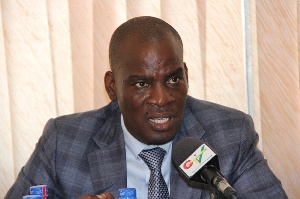The Minority National Democratic Congress (NDC) yesterday raised a litany of issues in Parliament on the alleged corrupt deals which have taken place under the leadership of President Akufo-Addo who has promised zero tolerance for corruption.
The Minority raised issues ranging from the $2.25 billion bond recently issued by the government, intention of government to raise another 15-year bond to settle outstanding debts in the energy sector, contaminated oil issues at the Bulk Oil Storage and Transportation (BOST) Ltd Company and the $15 billion Chinese money secured through a partnership agreement between Ghana and China for development projects in the country.
The Minority Leader, Haruna Iddrisu, who addressed the press, noted that all these ‘deals’ could be fraught with corruption and requested the government to bring the MoU underpinning the agreement between the government of Ghana and that of China over the $15 billion money to Parliament for scrutiny and approval.
The Minority leader said that the government ought to bring the MoU of the agreement between Ghana and China to Parliament for ratification in compliance with Article 75 (b)(a) and(b), which says that a treaty, agreement or convention executed by or under the authority of the President shall be subject to ratification by an Act of Parliament and a resolution of Parliament supported by votes of more than half of Members of Parliament.
He said as the Supreme Court has rightly interpreted in the case of the Gitmo 2 where a similar agreement was reached between the then NDC government and United States of America over the hosting of former two Guantanamo Bay Prison inmates, it would be ideal for a similar case to be brought to parliament.
He said per the Supreme Court’s ruling, it is clear that the agreement reached between Ghana and China over the $15 billion money for development projects in Ghana should be brought to Parliament for ratification.
The minority leader also expressed serious concerns over the Ministry of Energy’s handling of the sale of contaminated oil by the Managing Director of BOST, Alfred Obeng Boateng
He said instead of the Ministry allowing its own committee that was set up by the Minister to conduct investigations into the matter, it was rather relying on investigations carried out by the Bureau of National Investigations (BNI) and the National Security.
“In most the bizarre and shameful twist, the same Minister of Energy addressed a press conference yesterday, July 4, 2017 claiming that even before his own committee will get to work, the BNI and the National Security have exonerated the BOST Managing Director, Alfred Obeng Boateng and absolved him of all wrongdoing,” Haruna Iddrisu said, stressing that Tuesday, July 4 will go down in history as Ghana’s day of shame.
According to the Minority leader, the alleged naked cover-up is an insult to Ghanaians and an affront to the laws of Ghana.
“The signs are now crystal clear that the Akufo-Addo/Bawumia government has no commitment to fighting corruption,” he said, adding that the new NPP government has come to ironically dash the hopes of many Ghanaians by rather entrenching the canker of corruption.
On the issue of the government going for 15-year bond to pay outstanding debts in the energy sector, the Minority leader said the bond could give the nation unnecessary financial burden, adding that the NDC government, through then Finance Minister, Seth Terkper, took appropriate steps to restructure the debt owed by the Power Sector industry players, which resulted in a renegotiation of outstanding obligations and this led to the affected banks cutting their interest rates for both the Cedi and Dollar components.
The minority also served notice that it will seriously pursue the $2.25 billion bond transaction by the government through all legal means since there is serious conflict of interest which could result in Ghana losing so much in the deal.
General News of Thursday, 6 July 2017
Source: dailyguideafrica.com













